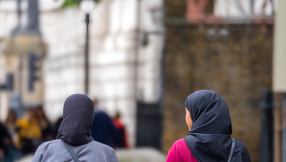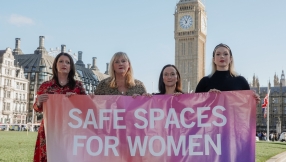As one president cedes power peacefully in the USA, on the other side of the world it is taking 16 neighbouring countries and the might of the UN to try and persuade Yahya Jammeh to do the same.
The extraordinary power struggle in The Gambia is passing by relatively unnoticed amid the protests and tensions around Donald Trump's inauguration.
But thousands have fled the West African country and foreign tourists were hurriedly evacuated as tensions rose in the last days with many fearing violence and a possible civil war.
The dispute centres around Jammeh, the president since he successfully led a coup in 1994.
He lost last month's elections to Adama Barrow, who is now recognised by The Gambia's neighbours and the international community as the new president.
After initially accepting the result of the election Jammeh launched a challenge in the country's Supreme Court, claiming irregularities around the election process and alleging some of his supporters were blocked from voting.
The electoral commission accepted some of the results it initially published had contained mistakes but they did not affect the result.
Jammeh says that because the legal process is ongoing, it would be unconstitutional for Barrow to assume office.
Retaining power means he cannot be prosecuted under for alleged abuses he committed during his 23-year rule.
But 16 other West African leaders have united under the regional bloc Ecowas to insist Jammeh steps aside.
Barrow was sworn in as president at the Gambian embassy in neighbouring Senegal on Thursday.
Shortly afterwards Senegalese troops entered The Gambia to threaten Jammeh. He was given until 1200 GMT on Friday to step down, otherwise military action would follow.
At the same a United Nations security council resolution unanimously backed the action against Jammeh although it should be by "by political means first" and made no mention of force.
Senegal, which surrounds the much smaller Gambia, has been mandated to use force if necessary by the Ecowas leaders. Aircraft, troops and a warship have also been deployed by Nigeria, raising fears of an all-out conflict.
Jammeh is heavily supported by his military's elite regiment, most of whom are of the same ethnicity as him .
The army chief is also a strong loyalist but he has been quoted as saying he would not risk his men's lives in a political dispute.
Jammeh remains in State House and is heavily protected by the elite troops who have sworn to defend him. But it is much less certain whether the other army regiments would come to his aid, with local correspondents suggesting many want a peaceful solution.
Barrow has ordered the army to remain in their barracks and said those who defend Jammeh will be considered rebels.
But earlier this week Jammeh tried to strengthen his position by fixing a parliamentary vote to declare a state of emergency in The Gambia and extend his presidency by three months to cover that.
Because the vote was while he was legally still president, it is technically valid under Gambian law. So The Gambia now has two presidents. But other states have ignored the vote and said because Barrow won the election fairly he should go ahead and take power. Without the extension Jammeh's presidency officially ended on Wednesday at midnight.
Troops entering The Gambia had paused their advance to allow Jammeh to quit peacefully. But now the deadline has passed they are closing in on Banjul, the capital.













